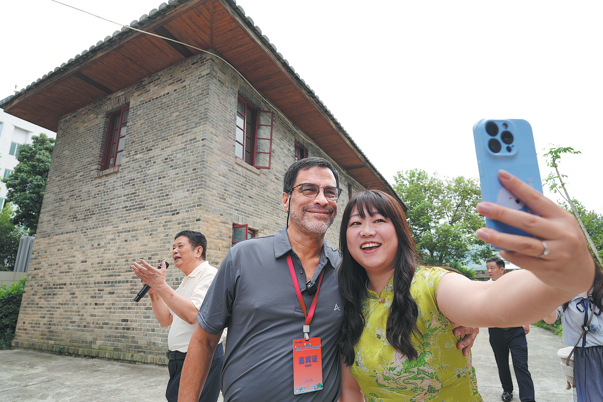Eight-point rules hailed as 'game changer'
Foreign officials say code of conduct offers model for clean governance, transparency

Foreign officials have commended China's eight-point decision, recognizing it not only as a code of conduct that promotes integrity and focuses on serving the people, but has also reshaped international perceptions of the Communist Party of China and set an example for clean governance worldwide.
The eight-point decision was adopted by the Party leadership in December 2012, days after Xi Jinping was elected as general secretary of the CPC Central Committee. It is a set of rules designed to address four deep-rooted, chronic bureaucratic issues, including official privileges and extravagant banquets.
Spelled out in just over 600 words, the eight-point decision established rules for Party leaders governing research tours, meetings, documentation and other official duties. It later expanded into a Party-wide initiative for all members to adopt its principles to improve governance conduct.
Over the past 13 years, Xi has on many occasions emphasized the need to fully implement the spirit of the eight-point decision on improving conduct and redouble efforts to strengthen Party building, stressing that the Party's conduct defines its image and shapes public support, and is vital to its survival.
According to official data, more than 225,000 cases of violations of rules were investigated nationwide in 2024 alone, and the eight-point decision has been hailed as a "game changer" in China's governance.
Houmed M'Saidie, political adviser to the president of Comoros, said the eight-point decision has helped to change how the CPC is perceived globally, as China's zero-tolerance stance on corruption offers lessons that many countries urgently need to learn. He described such governance practice as an encouraging model for other governments, including his own.
He added that anti-corruption measures and reforms have reinforced the CPC's bond with the people and strengthened its leadership and organizational capacity. "Under the leadership of President Xi, the Party is the engine of government and State structure. If we look at the results across many fields, we can see that the CPC is a great party," he said.
Abraao Vicente, a member of the National Assembly of Cabo Verde, former minister of the sea and former minister of culture and creative industries, highlighted the importance of transparency.
"Clean governance is essential to transparency and credibility," Vicente said, adding that China's experience shows that the fight against corruption can deliver tangible results.
Statistics have underlined China's determination in the fight against corruption. In 2024, disciplinary inspection and supervision agencies nationwide handled 2.175 million clues regarding problems, filed 877,000 cases and punished 889,000 people.
The African official noted that while corruption is a global challenge, Africa is often unfairly labeled as "corrupt". The key, he said, is for governments to constantly ask how they can better serve their people. The anti-corruption campaign led by President Xi, Vicente added, can be "more than an example" — it can also provide a model for tackling corruption across Africa.
"China's achievements over the past decade show that if we are committed to development, we have to respect the principles of open markets, government transparency, innovation, investment in education and youth development," Vicente said.
He added that, like China, Africa has a young and growing population, making education and skills training vital. "If Africa and China can build consensus on governance, they will become strong partners. We must learn more about China."
Shezra Mansab Ali Khan Kharal, Pakistan's minister of state for climate change and environmental coordination, called the eight-point decision "an important and profound" initiative.
"In most developing countries, we have found that corruption brings progress to a standstill. No real progress can be made because everything is undermined by corruption," she said.
"President Xi Jinping is strongly committed to reform and takes responsibility for its implementation. The CPC has undertaken major reforms under his leadership, and we can now see China's progress — poverty reduction, social reforms and economic advancement," she added.
Kharal was one of the participants in the Peking University Dongfang Scholarships Program in September, attending courses and visiting several provinces to observe China's reforms.
Recalling her trip, Kharal said that the changes have delivered tangible progress in areas ranging from agriculture, industry and technology to education, healthcare and social services.
zhaojia@chinadaily.com.cn

































